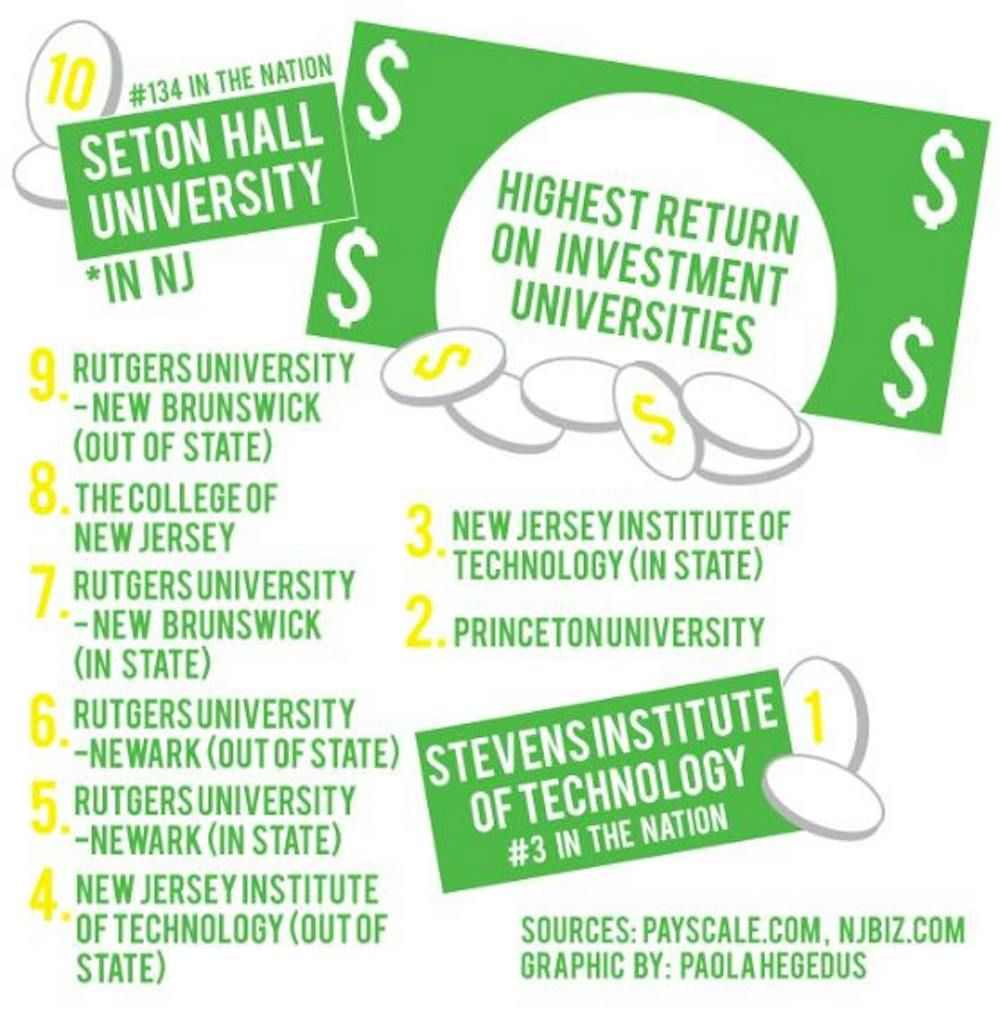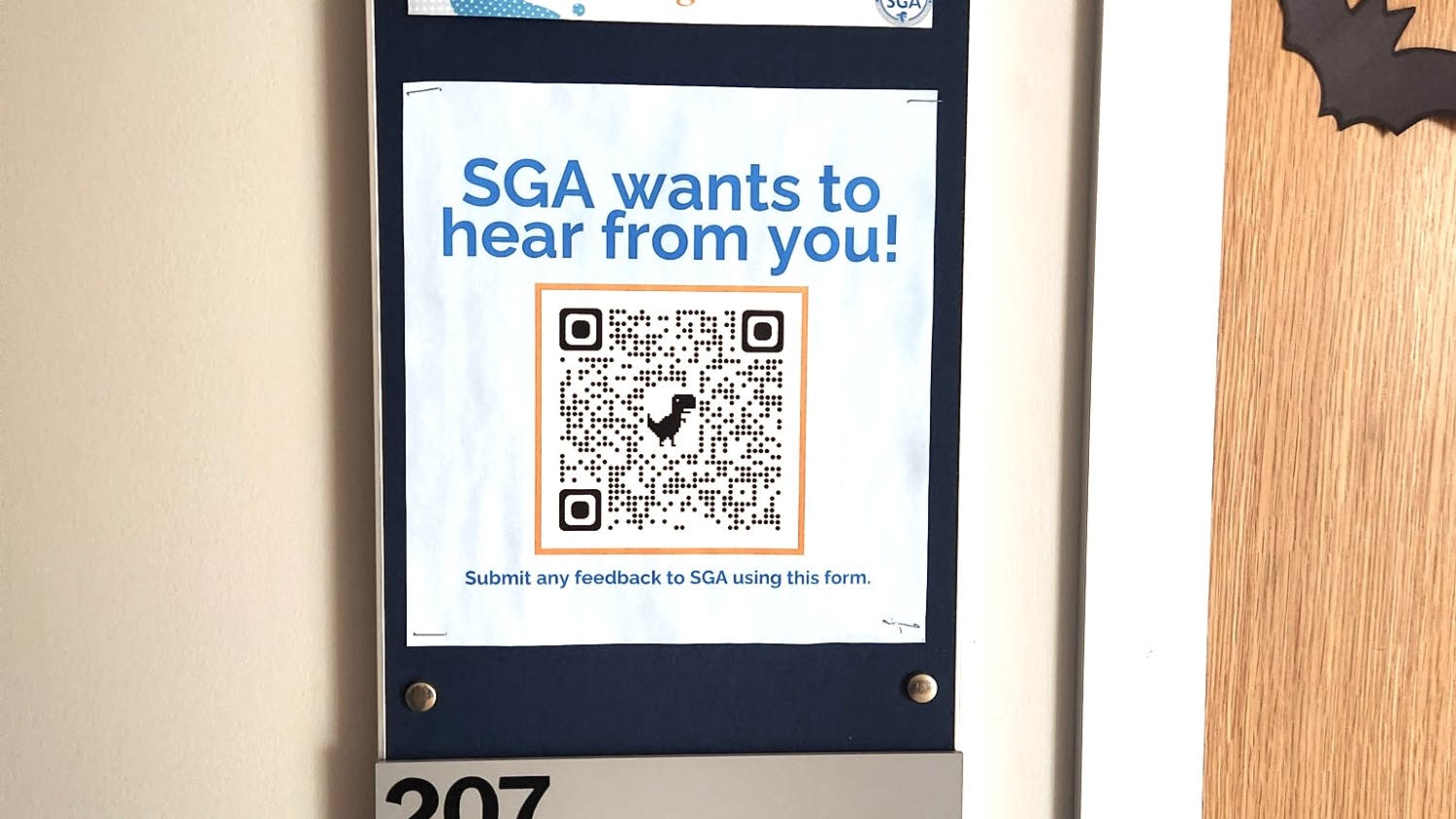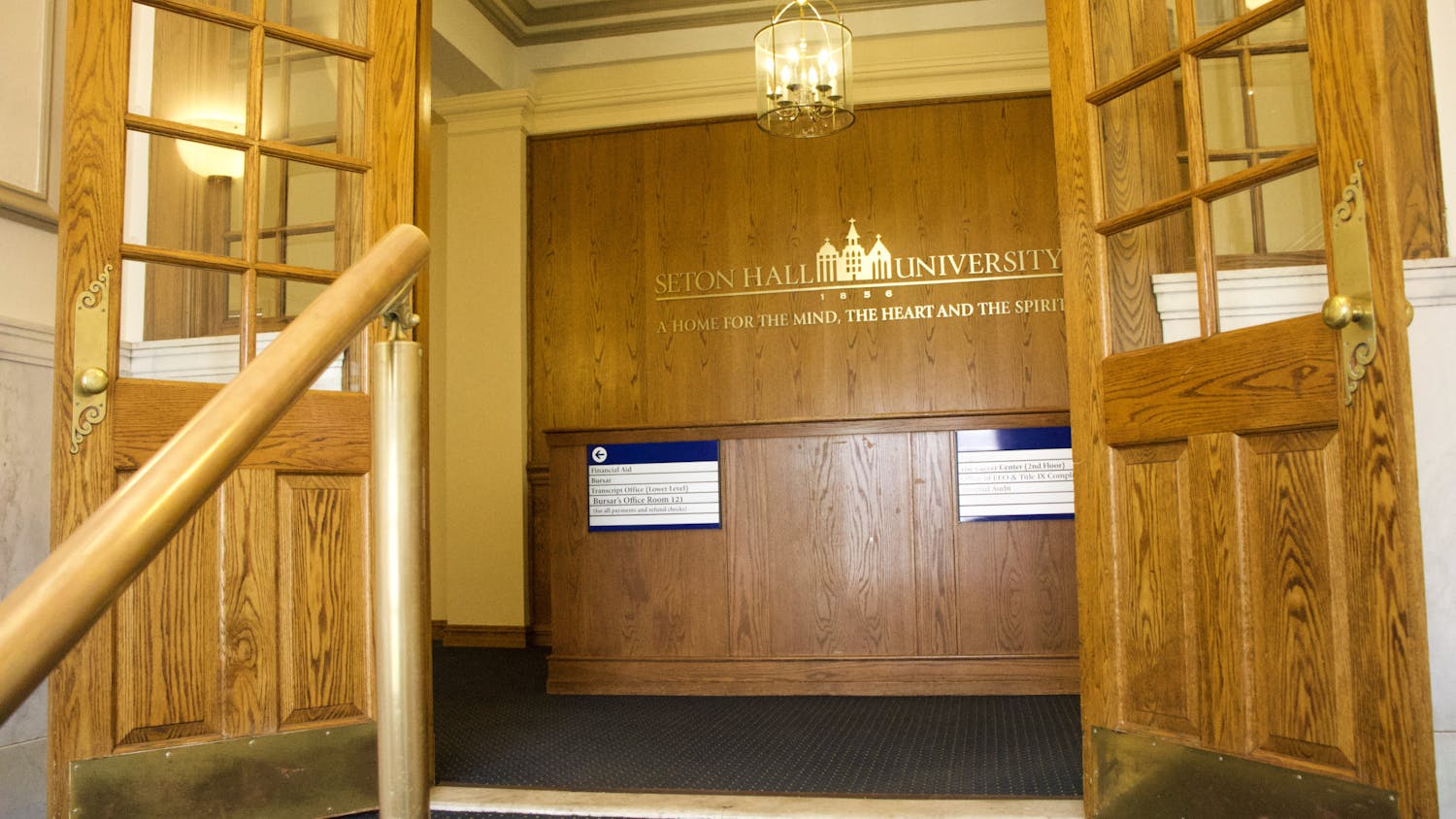Seton Hall was recently ranked tenth among colleges in New Jersey for the highest 20-year net return on investment. However, this ranking can be misleading. According to the latest annual survey by PayScale, Inc., a private research firm, Seton Hall is ranked tenth, but only six New Jersey universities rank higher.
 This is because the report counts some schools twice, one for in-state students and again for out-of-state students. The New Jersey schools that have a higher return on investment than Seton Hall in this 2015 survey include, in order from highest to lowest ROI: Stevens Institute of Technology, Princeton University, New Jersey Institute of Technology for both in-state and out-of-state students, Rutgers University at the Newark campus for both in-state and out-of-state students, Rutgers University at the New Brunswick campus for both in-state and outof-state students, and The College of New Jersey.
In the nation, the University ranked 134th of 1223 American universities, beating more prominent schools such as University of Chicago (142), Villanova University (165), and New York University (174).
Those with higher ROI rates than Seton Hall in New Jersey are ranked nationally as follows: NJIT in-state ranked 26, NJIT out-ofstate ranked 36, Rutgers Newark campus in-state ranked 41, Rutgers Newark campus out-of-state ranked 61, Rutgers New Brunswick campus in-state ranked 91 and Rutgers New Brunswick campus out of state ranked 132, two spots before Seton Hall.
According to the report, the money amount is calculated by taking the difference between 20 year median pay for a student with a bachelor’s degree and 24 year median pay for a high school graduate, minus the four year cost. Tuition and fees, room and board, and books and supplies were factored into the four year cost of a university.
The total four year cost of Seton Hall is higher than seven of the higher-ranking New Jersey universities. And, of the top ten rankings, Seton Hall students have the highest average amount of loans and the second lowest graduation rate. However, it typically takes four years for Seton Hall students to graduate, while it takes students from five of the higher ranking universities, including Stevens, five years on average to graduate.
Seton Hall’s undergraduate programs are similar to Rutgers and NJIT, however the Rutgers New Brunswick campus and NJIT both offer engineering programs to complete on campus. When asked if knowing Seton Hall’s ranking would have made a difference in their college decision Sean Gall, a sophomore physics major, said the ranking would have.
“My college decision was between Seton Hall and Rutgers. I wanted to go to Rutgers for engineering but wasn’t sure about it and ended up coming here instead,” he said. “If I knew that, then yes it probably would have made a difference.”
For the class of 2014, 86 percent of Seton Hall students are employed six months after graduation and 94 percent of students who wanted to go to graduate school achieved this, according to Reesa Greenwald, director of The Career Center.
“I’d like it to be 100 percent but it’s never going to be 100 percent,” she said. “Some of these people weren’t even looking, some students said they wanted to travel for a year first. In order for us to get to (86 percent), we help students from the time they get here to help them figure out what they want to do and how they are going to connect to employers.”
One factor in the rankings has to do with the programs offered at each university. Stevens produces students with the training for high-paying careers compared to Seton Hall which, for example, does not have its own engineering department. Seton Hall offers 85 majors, more than half of which are bachelor of arts while Stevens offers 34 majors to choose and customize and only 20 percent are bachelor of arts.
In a direct comparison though, Stevens’ Howe School of Business offers similar programs as the Stillman School, such as economics, finance, management and marketing. The descriptions of each concentration tend to focus on technology-related development at Stevens compared to Seton Hall’s programs. Several business majors said knowing the ROI rankings would not have made an impact on their college decision.
Amanda Sulkosky, a sophomore accounting major from Stewartsville, N.J., said, “It wouldn’t have made a difference to me. I came to Seton Hall for the scholarship and the leadership program at the Stillman School.”
Rutgers New Brunswick’s average financial package for incoming freshman is $19,434 with approximately 60 percent of all students receiving some form of financial assistance, while Seton Hall’s average financial aid package for incoming freshman is $35,620, with 96 percent of incoming students receiving some form of assistance, according to collegefactual.com.
The two highest ranked universities in the state, Stevens and Princeton, were ranked third and ninth respectively in the nation. The top five universities in the nation are known for their science, engineering and technology departments.
The highest paying bachelor’s degrees are in engineering while the lowest paying are in the humanities, according to a study by PayScale, a private company that collects and analyzes data related to “salary surveys,” according to PayScale’s website.
Emily Balan can be reached at emily.balan@student.shu.edu
This is because the report counts some schools twice, one for in-state students and again for out-of-state students. The New Jersey schools that have a higher return on investment than Seton Hall in this 2015 survey include, in order from highest to lowest ROI: Stevens Institute of Technology, Princeton University, New Jersey Institute of Technology for both in-state and out-of-state students, Rutgers University at the Newark campus for both in-state and out-of-state students, Rutgers University at the New Brunswick campus for both in-state and outof-state students, and The College of New Jersey.
In the nation, the University ranked 134th of 1223 American universities, beating more prominent schools such as University of Chicago (142), Villanova University (165), and New York University (174).
Those with higher ROI rates than Seton Hall in New Jersey are ranked nationally as follows: NJIT in-state ranked 26, NJIT out-ofstate ranked 36, Rutgers Newark campus in-state ranked 41, Rutgers Newark campus out-of-state ranked 61, Rutgers New Brunswick campus in-state ranked 91 and Rutgers New Brunswick campus out of state ranked 132, two spots before Seton Hall.
According to the report, the money amount is calculated by taking the difference between 20 year median pay for a student with a bachelor’s degree and 24 year median pay for a high school graduate, minus the four year cost. Tuition and fees, room and board, and books and supplies were factored into the four year cost of a university.
The total four year cost of Seton Hall is higher than seven of the higher-ranking New Jersey universities. And, of the top ten rankings, Seton Hall students have the highest average amount of loans and the second lowest graduation rate. However, it typically takes four years for Seton Hall students to graduate, while it takes students from five of the higher ranking universities, including Stevens, five years on average to graduate.
Seton Hall’s undergraduate programs are similar to Rutgers and NJIT, however the Rutgers New Brunswick campus and NJIT both offer engineering programs to complete on campus. When asked if knowing Seton Hall’s ranking would have made a difference in their college decision Sean Gall, a sophomore physics major, said the ranking would have.
“My college decision was between Seton Hall and Rutgers. I wanted to go to Rutgers for engineering but wasn’t sure about it and ended up coming here instead,” he said. “If I knew that, then yes it probably would have made a difference.”
For the class of 2014, 86 percent of Seton Hall students are employed six months after graduation and 94 percent of students who wanted to go to graduate school achieved this, according to Reesa Greenwald, director of The Career Center.
“I’d like it to be 100 percent but it’s never going to be 100 percent,” she said. “Some of these people weren’t even looking, some students said they wanted to travel for a year first. In order for us to get to (86 percent), we help students from the time they get here to help them figure out what they want to do and how they are going to connect to employers.”
One factor in the rankings has to do with the programs offered at each university. Stevens produces students with the training for high-paying careers compared to Seton Hall which, for example, does not have its own engineering department. Seton Hall offers 85 majors, more than half of which are bachelor of arts while Stevens offers 34 majors to choose and customize and only 20 percent are bachelor of arts.
In a direct comparison though, Stevens’ Howe School of Business offers similar programs as the Stillman School, such as economics, finance, management and marketing. The descriptions of each concentration tend to focus on technology-related development at Stevens compared to Seton Hall’s programs. Several business majors said knowing the ROI rankings would not have made an impact on their college decision.
Amanda Sulkosky, a sophomore accounting major from Stewartsville, N.J., said, “It wouldn’t have made a difference to me. I came to Seton Hall for the scholarship and the leadership program at the Stillman School.”
Rutgers New Brunswick’s average financial package for incoming freshman is $19,434 with approximately 60 percent of all students receiving some form of financial assistance, while Seton Hall’s average financial aid package for incoming freshman is $35,620, with 96 percent of incoming students receiving some form of assistance, according to collegefactual.com.
The two highest ranked universities in the state, Stevens and Princeton, were ranked third and ninth respectively in the nation. The top five universities in the nation are known for their science, engineering and technology departments.
The highest paying bachelor’s degrees are in engineering while the lowest paying are in the humanities, according to a study by PayScale, a private company that collects and analyzes data related to “salary surveys,” according to PayScale’s website.
Emily Balan can be reached at emily.balan@student.shu.edu





